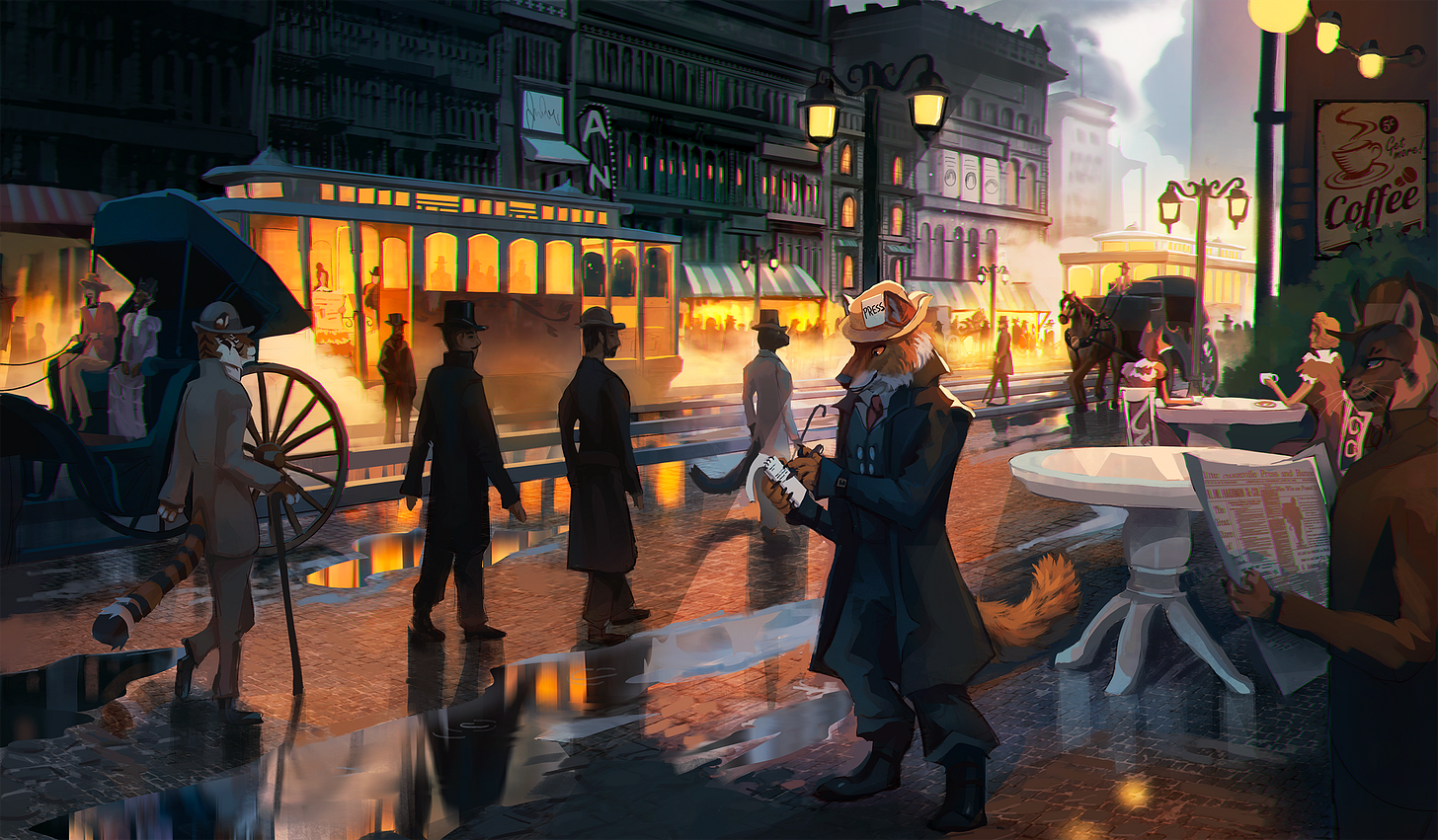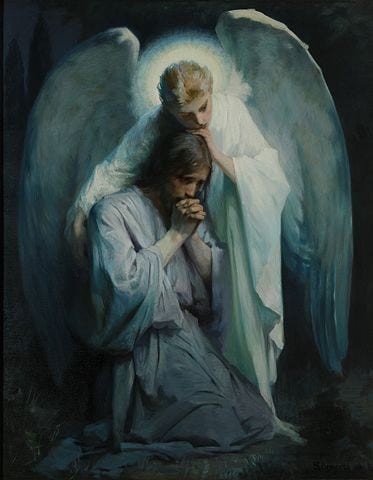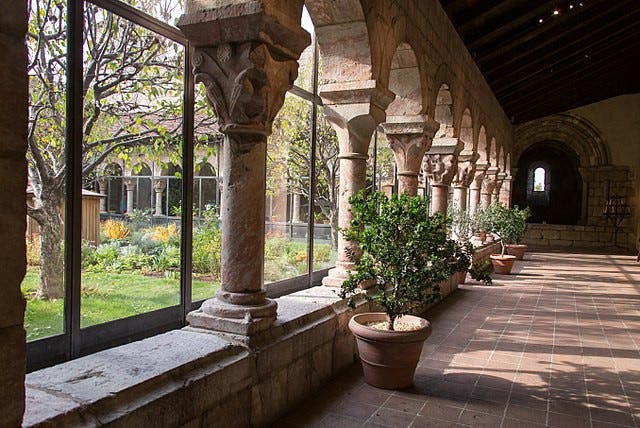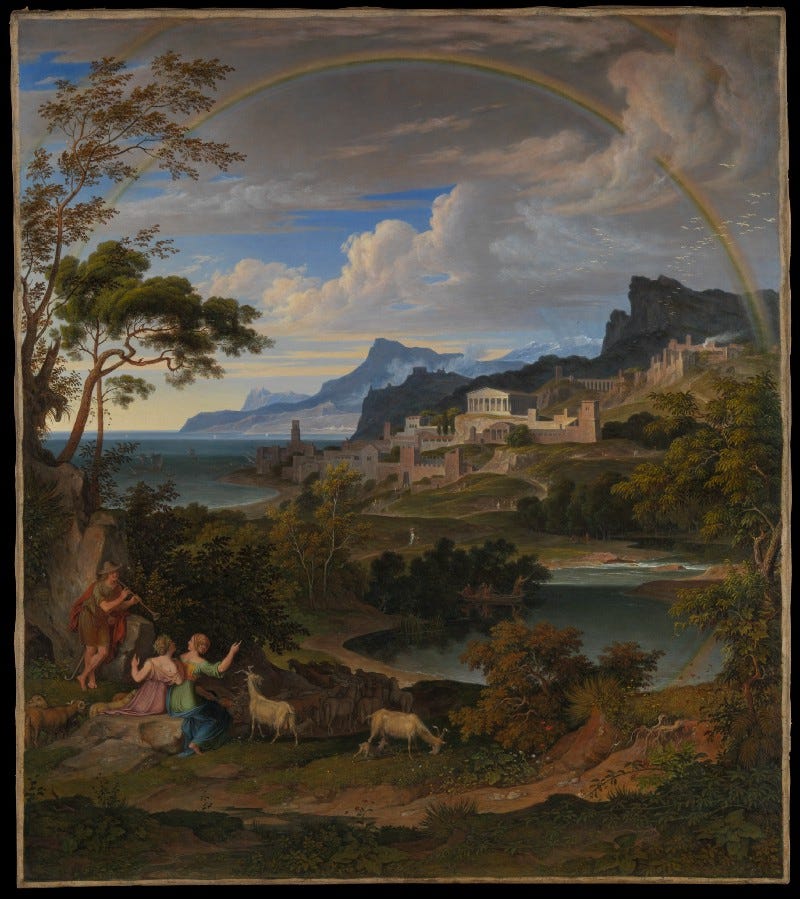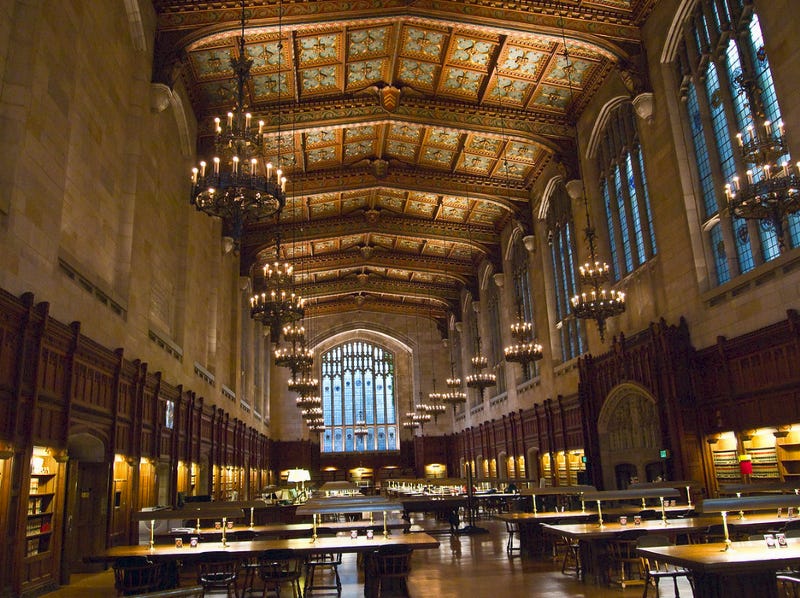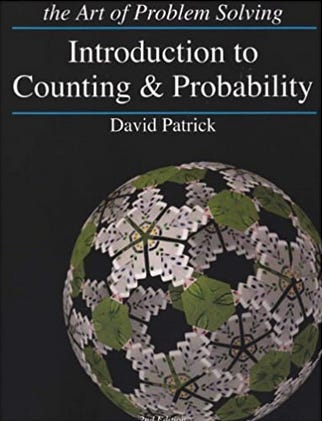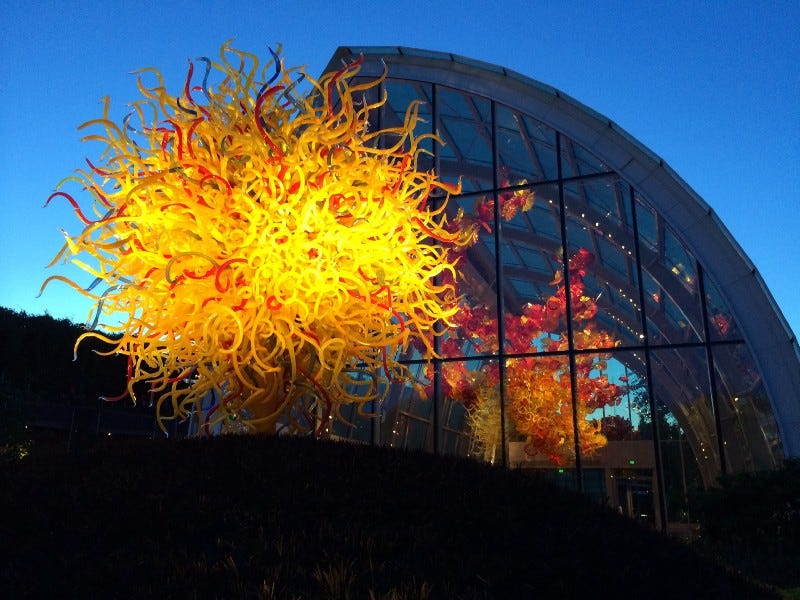A Word of Self-Introduction
More than you ever wanted to know about me
Author’s Note: I was asked to write a viewpoint focus for an ongoing series on The Motte, and wrote more than I expected. The result is probably the most comprehensive introduction I’ve yet written to what I believe, so I’m publishing it here so I can more easily refer back to it later. If you are curious about who I am and what I think, this is as good a starting place as any.
(1) Identity. What political and moral labels (liberal, ancap, Kantian, etc.) are core to your identity? How do you understand these terms?
Once upon a time, I held firmly to Paul Graham’s advice to keep your identity small. Now I think being a “free thinker” without achievement to match just means you weren’t capable enough to build a culture out of your thoughts or humble enough to join a culture more capable than you. Now, I am more interested in first followers: people who see something good and are willing to make it great by committing their trust to it.
With that in mind, I am neither yet capable enough to build a culture out of my thoughts or humble enough to join a culture more capable than I am. My identity lies in hopeless disarray, and what I have left to build on are a set of strongly felt principles that leave me culturally homeless. Let me try to lay some of those core principles, such as they are, out. I will be a bit grandiose, because there is no better time to be grandiose than when laying out one’s principles.
Close to my core, I am anti-entropy. The most natural things in the universe, I am fond of saying, are lifelessness, emptiness, and decay. Life is unnatural. Growth is unnatural. Progress is unnatural. We, and our ancestors human and inhuman, have fought for every inch of ground we’ve conquered, and I intend for us to keep fighting. Previously, I have described my stance as that of the hopeful damned: I believe each of us will die, and slowly our world and universe will grind to a halt. We are, individually and collectively, damned. Our task, understanding that, is to reject it, to push against it, to strive towards the impossible simply because it is right. If we must fail, we should fail with glory. But we must aim to succeed.
I am, perhaps, a teleotheist, holding “the idea that God comes at the end rather than at the beginning”, and that the greatest purpose in life is to “work towards… that fine day when God and Heaven do exist.” This is a new label for me, and I am trying it out to see if it continues to resonate.
In the same vein, I identify with a pursuit of excellence, the individual and collective upward path. Here, I hold to that old Christian imperative: Be ye therefore perfect. I carry a measure of respect for the hypocrites, who hold their behavior to standards too high for them to yet reach, and little regard for those who keep their standards so low hypocrisy is impossible. Again, I recognize the futility of the pursuit, but I can’t help but notice those who shrug in the face of the futility and push towards it anyway. By accepting the the rigorous, tedious path of training and restraint, they become in a literal sense more free than those who never enter that path, able to be and do things the rest of us can only marvel at. This pursuit lies at the core of my passion for education. What can people become? I want to know. A firm conviction of the importance of truth and beauty comes with this.
I am resolutely pro-life, in a broad sense. The consistent life ethic resonates with me, and I would add to that a passionate pro-natalism and a should-be-more environmentalism (a loud side of environmentalism tends towards strong anti-natalism and more in that vein, which makes it hard for me to find a comfortable spot in the sphere). Inasmuch as there exists a population cap, I believe our duty is to raise it. Inasmuch as human life threatens the rest of our ecosystem, I believe our duty is to overcome that threat. On an individual level, I note that having children and raising them well is the single most meaningful contribution the vast majority of us can or will make to humanity. Raising good kids is a force multiplier that echoes through the ages. Everyone, lacking extraordinary excuses, should do so to the best of their ability. And I do mean everyone, not just some predefined “right kind” of people. I am pro–humanity as a whole, accepting as a firm axiom the imperative to treat all people as ends in themselves.
I am pro-civilization, which I view as a precarious continuation of the anti-entropy push begun when the first life appeared. I stand in awe of what humanity has collectively built, and think we need to take our duty to it seriously: to understand, preserve, and build upon what has been left for us, to ensure it can stick around for our progeny to enjoy. I take a Hobbesian view, seeing anarchy of all sorts as pushing against the house of cards we have built, as a threat to return us to nasty, cruel, brutish, short lives in the state of nature. Connected to this, I tend to favor law-and-order stances when it comes to crime and the state. At the same time, I am often happiest in the mountains and the woods, as far from civilization as modernity allows, or finding patches of wilderness or abandoned buildings slowly being reclaimed. I am sympathetic both to Georgist/urbanist YIMBY pushes in cities and rewilding initiatives.
I am anti-consumption. I have a deeply felt antipathy for shopping malls and flashy ads, luxury brands and consumable junk. I last set foot in a non-grocery, non-work-mandated store more than a year ago, and it was a Goodwill so I could get a pair of pants to wear. Getting and spending we lay waste our powers. This includes content consumption as well, though there I am both weaker and more moderate. We consume too much, create and maintain too little. Passivity and hedonism are bywords for me.
Pulling a few together: I am a communitarian localist, a pluralist, and a liberal multiculturalist. Everyone deserves a mother: that is, I do not think human relations are infinitely fungible, and think all people deserve to have families, friends, and communities who devote serious time and energy to their well-being. By extension, this means a duty to your family, your friends, your community. I am fond of the vision in The Diamond Age, of a society defined by interacting “phyles” that people can join or leave at will, but that carry shared values and expectations while you are within them. Liberalism, I hold as a bedrock peace treaty for group interactions, but one that rots when used as the core moral guidepost to follow. “Either I’m dead and I haven’t done anything that I want / Or I’m still alive and there’s nothing I want to do” — This lyric always comes up when I think about liberalism. Do what you want, sure — but what ought you want to do? I think the healthiest liberalism is “liberalism And”: allow others to live as their consciences dictate, but be unambiguous and unapologetic in staking out your own territory. This comes with realism: a truly multicultural society will face serious values conflicts. So long as exit rights are preserved in any given subculture and they are willing to commit to mutual non-aggression within a liberal framework, I hold that they should be given extreme leeway to hold to their vision of the good within their spaces.
Connected to both my localism and my anti-consumption urges, I am deeply skeptical of Universal Culture, or American cultural imperialism abroad. How dreary it will be if we can go anywhere and do anything, only to find that everywhere and everything has the same set of stale choices on offer. False freedom if I’ve ever seen it. As an anecdote, my favorite time abroad was when I travelled to Taiwan. Seared into my memory there is the moment of stepping into its flagship building, Taipei 101, and seeing it chock-full of Western shops. More on this in Problems, below.
I am staunchly pro-immigration. While recognizing the complexities in reality, I was deeply influenced by a foundational myth of immigration in pursuit of ideals: of pilgrims landing on Plymouth rock; of Mormon pioneers sailing across from England, crossing the plains, and building a civilization in a desert; of America lifting her lamp beside the golden door. My future children too, more so, as my boyfriend is the son of immigrants. I will reluctantly cede to practical concerns, but my ideal is freedom of movement to the greatest feasible extent. I want people to be able to build alongside their tribes however possible, and the healthiest tribes I see are not ones defined by borders or immutable factors.
Perhaps awkwardly, I am also pro–welfare state. I do not think a right to be taken care of exists, but provided the society I live in is wealthy enough to feasibly do so, I want an unstigmatized baseline level of subsistence: free-at-point-of-service baseline levels of food, housing, education, and health care, albeit following Singapore’s lead in terms of avoiding the worst pitfalls of human behavior regarding free stuff. Here, I do think a degree of heartlessness is necessary, with immigration not granting access to the welfare state absent realistic conditions being set, and I similarly think the primary beneficiary should be the primary cost-bearer (hence my support for universal income-based repayment for college instead of free college, for example). But inasmuch as it is feasible, that is the culture I want to occupy.
These are all moral instincts, not nuanced cultural or policy proposals. They inform the type of person I want to be and the type of society I want to live in, but do not tell me how to get there or whether such a world is even possible. But they’re all worth emphasizing, because every one of my on-the-ground personal, cultural, and political goals gets filtered through this lens: does it bring my sphere closer to this vision, or further? If people want to effectively convince me to change my immediate object-level views, they must either shift my instincts on these axioms, or show how their goals align with these axioms.
In short, I am a pragmatic, moderate, milquetoast centrist. My values are widely held in isolation but not in combination. I take alliances as they come but see the current cultural/political struggle as an uneasy balance between value systems alien to my own, something to be worked around but not to be consumed by. I am centrist by chance, not by choice: I hope to maintain a clearly-defined vision of the good and would be happy to commit to a tribe who could help bring it about, but when existing tribes pursue disparate visions, my net position appears roughly in the center.
(2) Influences. What thinkers, writers, authors, or people in your personal life have contributed most to your worldview?
I’ll get the obvious one out of the way immediately: Joseph Smith, Mormonism, and Christ/Christianity more broadly. I am no longer Mormon or any form of Christian, but my worldview grew while nestled deep within the faith, and my leaving served not as a repudiation of the worldview I found myself developing within the faith, but a recognition that the worldview could not be made to wholly align with Mormonism. Wrestling with Mormonism, both while I was a member and now having left, is unquestionably the core influence on my thought. Joseph Smith is one of the most compelling, unusual figures in American history, and he did more than all others to set the course of my ancestors, my family, and my own life. Other names worth mentioning connected to the church: Lowry Nelson, who forced me to acknowledge the extent to which Mormonism could warp moral views towards wrong (in the case he was fighting against: grim racism), and was my moral impetus to drop out of activity. Dieter F Uchtdorf, Hugh B Brown, James Talmage, and B.H. Roberts, church leaders who represented the best of the compassionate, truth-pursuing side of the faith that resonated with me. The Preacher of Ecclesiastes, still one of my favorite fragments of literature. C.S. Lewis, perhaps the most resonant of all defenders of Christian thought.
Next, I ought to cover the second overarching theme of my writing, education. No one writer or researcher properly encapsulates my views, so I am in debt to many. I’ll start with an unusual pairing: K. Anders Ericsson and Arthur Jensen. Ericsson was the father of expertise research, resolute that we could become more than we are, and determined to find the extent to which we could push our limits. Jensen was a brilliant psychometrician who tirelessly worked to understand, explain, and defend mental testing and understand the limits placed on us by forces outside our control. I believe a synthesis of their work is urgently needed and could bear immense fruit if handled appropriately. In the field of gifted education, I need to nod with gratitude to Leta Hollingworth and Miraca Gross in particular, along with Lewis Terman. Alfred Binet and Charles Spearman come to mind as well, as does James Flynn, who did more than almost all others to clarify precisely how IQ should be viewed. B. F. Skinner, whose boxes haunt my dreams and adorn my daydreams. Daniel Kahneman, as much for his commentary on adversarial collaboration as for his brilliant broader research. Robert Bjork, Siegfried Engelmann, and Hermann Ebbinghaus are three standouts in experimenting and building meaningful theory in the unglamorous day-to-day grunt work of learning. (EDIT: I left Julian Stanley out of this list, and I oughtn’t have. He’s another major inspiration.)
In terms of less formal research, I’m fond of two Joshuas: Foer with Moonwalking With Einstein and Waitzkin with The Art of Learning. Laszlo Polgar and John Stuart Mill’s father both deserve appreciation for their practical demonstrations of how much kids are capable of learning. Richard Rusczyk, creator of Art of Problem Solving, for capturing the beauty of math in probably the best extant curriculum. Jordan Peterson and John Vervaeke come to mind. Michael Pershan, my adversarial collaboration partner from a few years back, who tirelessly pressed me on every aspect of my education views and forced me to properly engage with and understand the issues I care about. Other friends who I won’t mention by name here because most of our engagement has come in quiet back-channels, but who have massively impacted my thought on education and psych. You guys know who you are.
That out of the way, I’ll move to the thinkers who shaped my childhood outside those two categories, starting with Bill Watterson. Calvin & Hobbes is a cultural masterwork, made more so by the life choices Watterson framed it with. I have a deep, lasting respect for it. Many, many YA sci-fi/fantasy writers: Orson Scott Card, of course, who gave me this account name and the story to frame it. Brandon Sanderson. Jonathan Stroud (The Leap will always hold a special place in my heart), Diana Wynne Jones, Neal Shusterman, Brian Jacques, Roald Dahl, Jean Craighead George, Scott Westerfeld. Tim O’Brien, unquestionably, with The Things They Carried, his raw account of fighting a war he opposed. It’s hard to know how to categorize the impact of all their work, but I appreciated and absorbed it all. While I’m at it, I’ll mention Pokemon, Neopets, and Dungeon Crawl: Stone Soup as three games that did a lot to capture my imagination, command my time, and press me towards thinking about why they were so effective at that.
Aesthetically, I am captured by the old-growth rainforests of the Pacific Northwest, the red rocks and mountains of my home in Utah, and forests and mountains more broadly. In terms of human-made projects, The Cloisters made a strong impression on me when I visited, as did the Butchart Gardens, which upon visiting made me decide I ought to be a gardener someplace like that if all else fails. Though I have not seen them in person, La Sagrada Familia and Cambodian ruins fall in a similar spot in my mind. Taipei and London are the cities I’ve fallen in love with while visiting. M.C. Escher, whose art adorns most of my walls, deserves mention. So does an art exhibit I saw awhile back blending the ancient and modern in Asian art, with Infinite Landscape as a centerpiece, along with Chihuly Garden and Glass. Leonardo da Vinci, though less for his art than his life. Salvador Dali, for sure. Oh, and a number of furry artists, and the fandom as a whole.
On to political and cultural thought. Scott Alexander, unsurprisingly, is a major influence for me, as are the various forums that have sprung off to discuss his work on reddit. I’ve built a lot of friendships in those spaces and have been deeply influenced by the thought of more than a few of them, but will keep their names private in this piece. If you think you might be on that list, you probably are, and I appreciate it. Outside that sphere, it won’t surprise anyone who knows me to hear me mention Lee Kuan Yew first, and he is unquestionably the political figure who resonates with me most. As a teenager, I was particularly drawn to the stories of Malcolm X and Nelson Mandela. Herbert Hoover, both via SSC’s review and his magnum opus, deserves a mention. Martin Luther fits here more than in my mildly but not really separate ‘faith’ category, as does Baháʼu’lláh. Cultural critics like Robert Putnam and Neil Postman weigh on my mind regularly, as do others who explore the cultural crises of modernity. No single (mainland) Chinese thinker has has deep influence on me, but Chinese history and culture deserves a mention as well.
In terms of personal influences, my parents have an unshakeable spot as role models. I can only hope to be as good a spouse and parent as either of them. They gave me a charmed youth where most troubles in the world seemed ever blessedly distant. Both both when real hardship hit our family and when I broke the news first that I was stepping away from their faith, then that I was dating other men, they responded with a level of grace, dignity, and love I aspire to. My siblings, grandparents, aunts, and uncles come to mind as well, for similar reasons. Of all the complaints I could level at the world, family is not one of them, and I count myself lucky to be able to learn from them all. I could go on for pages about my fiance’s influence on me, of course, but I’m getting sentimental enough already, so I’ll spare you.
(3) Problems. In terms of sheer scale, what is the biggest problem humanity faces today? Alternatively, what is a problem that you think is dramatically underappreciated?
Almost no one is evil. Almost everything is broken.
We fight not against flesh and blood, but against powers and principalities.
Both of these ideas frame my thinking about problems.
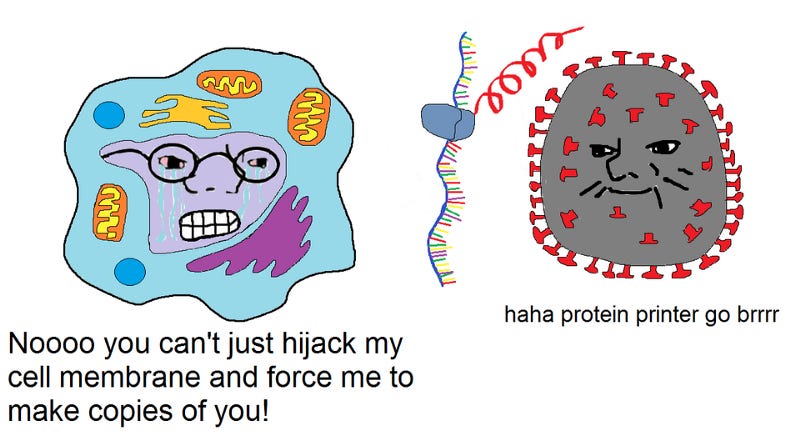
I have mixed feelings about technology. Naval puts it neatly. Eliezer Yudkowsky can worry about AI value alignment — I’m worried enough about technological value alignment. The best minds in the world are working to keep us in empty, hedonistic skinner boxes, learning through untethered experimentation just what our lizard brains want and how to give it to us. I think we need to take seriously the mismatch between short-term pleasure and the long-term upward path. This ties into my above fretting about Universal Culture. On the one hand, I love the internet, and spend most of my waking hours enjoying a view of the most fascinating cultural memes the world has to offer. On the other hand, I love the internet, and spend most of my waking hours enjoying a view of the most fascinating cultural memes the world has to offer… no matter what else I tell myself I intend to do.
I think this describes an increasing proportion of modern life, particularly for the low-conscientiousness (a group of which I am a not-so-proud representative). If it continues and intensifies — and it so easily could — I expect we will all spend most of our waking hours eagerly engaged in deeply compelling pursuits that we forget all about the second we look away from, with a pervasive gnawing feeling beneath that Something is Desperately Wrong. Technology is at its best when it enables us to pursue our best instincts, but we are inexorably drawn towards increases in comfort and ease, so it is forever a double-edged sword. Picture a wirehead stomping on a human face, forever, and you’ll feel my tension about technological value alignment.
Above, I said I’d dive more into Universal Culture. This ties into that. I see it as just so many cultural superstimuli, not precisely better than what came before, but more precisely attuned to our lizard brains, sufficient to sweep all else into corners. I don’t have an alternative, not really, but I fret about it a lot.
The political divide within the United States is another problem I spend a lot of energy thinking about, caught as I am between the tribes. A year or two ago, I was more optimistic that a resurgent center could bring a greater semblance of national unity about. This election pretty firmly quashed that. Now, I think the best direction to push is one of localism. You have to work with the people you have, not the people you want, and the United States is caught between increasingly incompatible sets of values and visions of the good. People, writ large, are not going to change their minds and abandon their values. So that values clash will either continue to intensify as each group wrestles for control of the whole country, or we’ll rediscover the role of liberalism as a peace treaty between otherwise-incompatible groups and figure out how to let those groups increasingly take care of their own. Maybe I’m wrong, and there’s a way to create some semblance of unity again, but I’m just not seeing it.
I wrote a couple of nice speculative paragraphs about causes (lack of right-coded institutions as religion becomes less accepted in the public sphere for the right, the ways political geography favors rural areas and the power of corporations for the left) and potential steps towards solutions on each side, but it didn’t feel right so I’m leaving it at that for now.
Last for now, I worry about ecological declines and collapses. I don’t spend enough time thinking, learning, or writing about any of this, so I hesitate to speak too much from a position of ignorance. But when I read about things like two-thirds average declines in animal populations, the visible effects of an increasing prevalence of endocrine-disrupting chemicals, ocean acidification, and on and on and on, I get more and more tense about the future. I’m personally not too fond of the framing highlighting emissions and warming over all else, mostly because I think it lets us off too easy and ties into a first-order effect that doesn’t sound as intuitively apocalyptic as some of the above. But I think environmentalism is a cause worth being serious about, and if I had to pinpoint the problem most likely to ruin the future, that would be it.
(4) The future. Do you think that the world of 2040 is, on balance, likely going to be better than the world of 2020? Why/why not?
I try to avoid speculating too much about the future, which is also why I’m skipping question 7 here. But in my heart of hearts? Probably not, no. I have a deeply pessimistic instinctive bent. Everything feels horribly fragile to me, where the more time you spend with any given system the more it seems about to collapse. I think technological advancement has masked and papered over aspects of structural decline, and I keep waiting for the other shoe to drop and something truly catastrophic to break. Will it happen by 2040? Maybe not. But it will happen sometime. On a long enough scale, pessimism always wins out.
But, look, it’s not like there’s some glorious, perfect past to return to. My pessimism is combined with a sense of awe at how many problems life, and humans, have met head-on and overcome up to this point. Things have never been more pleasant than they are right now. Steven Pinker’s charts sure do look pretty. I have immense trust in human ingenuity, after we exhaust all alternatives. And throughout all the messiness and horror that is the history of life, individuals, families, and communities have still found occasion to live deeply meaningful lives of quiet dignity, and to go into the night happy with what they’ve done and experienced. I expect that to still be possible for as long as we can keep this peculiar experiment rolling forward, and think we ought to cherish that and safeguard it.
I have little patience for future-pessimism that doesn’t lead to positive action. There is so much that needs to be done in every individual’s sphere of influence, and problems have never just up and solved themselves. Once, I could rely on the idea that everything would be all right once we made it through the trials of life and progressed onto a more glorious eternity. Now, I feel deeply that if there is salvation to be had, we will need to wrest it, piece by bitter piece, out of Moloch’s grasp. But we haven’t let that stop us yet, and hey — the future will belong to those who show up for it. Better get to it.
(5) Mistakes. What’s a major error of judgement you’ve made in the past about political or moral matters? This could be a descriptive error (e.g., predicting Brexit) or a normative issue that in retrospect you think you got badly wrong (e.g., failing to appreciate the importance of social cohesion).
Jeez, where to begin? I don’t count my belief in Mormonism itself as a major moral error — it was inevitable with my background. Some run-on effects are worth noticing, though.
Gay marriage is probably the best starting point, seeing as how my own is suddenly within sight. I was not, in any sense, supportive of it. That shouldn’t be a surprise, given my background, I suppose. I was a Mormon kid who deferred to my faith on moral matters. But I was deeply revulsed by gay relationships, felt the people pushing gay marriage were extremists and bullies, and was furious at the depth of antipathy towards Mormons in that whole sphere. I had no road to Damascus moment. It wasn’t any part of the catalyst for me to leave Mormonism. I did have a gradual easing up of hostility, and I became close friends with a gay guy majoring in gender studies on my Mormon mission among other experiences that made me slowly lose the disgust reflex, but in terms of politics it mostly manifested in “ugh I don’t know” followed by “huh, I guess I support gay marriage now” when I left Mormonism. Seeing Josh Weed divorce his wife was probably the final, most unambiguous “Yeah, I was wrong” moment.
I do remember having a firm conviction while an active Mormon that if Mormonism ever switched its stance to be in favor of gay marriage, I would first leave the faith, then start supporting gay marriage, in that order. That should give you an idea of the tangle my mind was in. But… yeah. I can’t take any sort of credit for being “on the right side of history” here, and find myself now the beneficiary of work by activists I unambiguously opposed. It’s an odd feeling. In retrospect, I think Andrew Sullivan’s conservative case for gay marriage makes perfect sense (but of course I do!), but at the time I was so caught up in the notion that gay people must be mistaken somehow about what they wanted, and “invite them into pro-social institutions in your coalition rather than giving them no choice but to oppose you” just didn’t register next to “they should just pursue straight relationships”.
So… uh, thanks, everyone who was in favor of gay marriage. I owe you one. The process question is more complex (I would have preferred it pass by popular vote), but my position has unambiguously flopped on the moral issue. It’s a difficult issue to reconcile my emotions and my mind on, though. I never noticed attraction to men growing up and suffered no trauma from my faith’s stance on homosexuality, but I did experience intense attacks and social isolation online as a result of being Mormon. Meanwhile, both when I left Mormonism and when I started noticing my sexuality, the great majority of my Mormon family and friends were understanding, loving, and supportive. So my emotional signals are largely reversed. …look, it’s messy. I’ll leave it at that. I will be forever unweaving peculiar tangles in my mind.
I could do this again and again for aspects of Mormon thought, but I think that one’s probably the most interesting.
Predicting Donald Trump was a major failure of mine. I simply could not believe people would ever take him seriously, much less elect him. I kept not believing until the day he took office, and half of me didn’t believe even then. His rise forced me to reevaluate a huge amount of what I thought I knew about politics and the people around me, and the process of trying to understand and come to terms with it is probably a lot of what led me to zero in on politics more and more after the two-year respite that was my mission.
Other than those two moments I expect I’ve been pretty much perfect, so let’s move on, shall we?
(6) Projects. Imagine you were a multi-billionaire with a team of a thousand world-class experts in any field. What would you build?
Among my highest priorities would be a college of education and a range of K-12 schools, built in line with the values and thinkers I outline above and serious about the process of education as building expertise. I want to understand exactly how much any given person is capable of, exactly what we can do to get them there, and build institutions that can genuinely move the needle. Given my own low conscientiousness, I have little patience for unschooling and calls to reduce structure. I want systems that take individual aptitude and personality as unchangeable givens (whether or not they are actually unchangeable, I believe it is most productive to view them that way), then figure out how to mold them into what they want to become anyway. Military boot camp and Mormon missions come to mind as illustrations of what is possible here, of how much localized culture can focus behavior. The buildings themselves would necessarily reflect the intent of the contents, and would be constructed with an eye towards aesthetic wonder.
Along with that would come the digital/curricular side. In my wildest flights of fancy, I picture a universal skill tree: a collection of all human knowledge and skills, organized in terms of strictly necessary prerequisites, presented in a pedagogically sound and engaging way. Here, skinner boxes and technological value alignment return: I would love to see what the same minds currently dedicated to optimizing World of Warcraft and Twitter, given sufficient resources and a sound foundation, could do in optimizing educational technology. We have immensely powerful mental tools at our disposal. Can they be harnessed towards the common good? Perhaps, or perhaps it’s a fool’s errand. But it consumes my imagination.
Oh, and I would start a cult. Religion is another of those powerful technologies I obsess and fret about. I experienced in depth its power to define a culture and transform lives, both for good and bad, growing up a Mormon in Utah. The history of Marxism, to my eye, serves as a demonstration that the same religious technology does not in fact require the supernatural. The woke social justice movement is still in its formative years, but I expect we’ll see its influence for decades or centuries to come. The message, to me, is clear: you want a culture, you plant a flag and give people a frame to build on. Neglect this responsibility, and you don’t create a perfect individualist society of free thinkers. You cede the ground of culture to those who can articulate something cohesive and organize for it.
Why a cult, specifically, as opposed to a political movement, a startup, or the like? Put simply, I think the world could use much more voluntary organization: like-minded people contributing their time and effort for each other’s good without centering financial incentives or being compelled (and compelling others) to do so. Mormonism demonstrates the extent to which it can be done, but frankly expends that effort and organization towards far too many meaningless dead ends. My dream would be a group with the organization and seriousness of Mormons, pursuing goals attuned more towards the needs of the world as it stands than the pursuit of being baptized in the name of dead people.
Some specific thoughts are here and here, but if you’ve read this far you already know where my mind is at. I am a traditionalist stripped of my tradition. I would like to get it back.
There’s much more I want to see done in the world, but projects in line with those are what speak to me personally. I’d probably try to put Wrath of Gnon and a bunch of like-minded urbanists to work on a city of some sort. I’d dump a lot of money towards conservation, rewilding, and other environmental initiatives, provided sufficient values alignment. There’s a whole laundry list of generally Good Causes I would want to see expanded. But my thoughts in other areas are much more often just an imperfect repetition of more serious thinkers in those areas, and I would mostly aim to enable them.
(8) Recommendations. What’s a book, blogpost, movie, band, or videogame that people may not know about that you’d like to take this opportunity to promote?
Good Enough Homeschool. For a while, I meant to compile a list of the best homeschooling resources I know, partially for personal use, partially to advise others who might enjoy my education writing. Then I came across this site, created by some much more experienced educators who closely align with the philosophy I look for in education and know more than I do. If you are interested in education resources, dig through their recommendations. I endorse them wholeheartedly.
Related, I’ll never let too long lapse without shouting the praises of Art of Problem Solving. Play around with a few problems on Alcumus, poke around the site. It’s the math curriculum of my dreams, I love it, and I think everyone who likes math should also love it and loudly praise it. It’s by and for students who are very, very good at math and love the subject. It is good.
I also ought to include Western Governors University in my recommendations. It is not the most challenging school. It is not the most prestigious school. But if you are looking to get a (yes, regionally accredited and Respectable) online degree in a way that cuts through a lot of the nonsense and expense of many college experiences, it does the job. Thoroughly manageable tuition costs, a competency-based learning model that means you can get through the whole thing in a year or less if you’re capable and motivated enough. (For those wondering: I was on pace to do so with less than a quarter of the degree path left, then got caught up in other things. Now I have the uneasy honor of knowing at least two people who have lapped me by starting, and finishing, their degrees at the university based on my recommendation. So it goes.)
Those are my practical, education-centered recommendations. As far as more fun/casual things go, well, my taste in music is hilariously pedestrian, and you don’t want my recommendations, unless you also unironically like Imagine Dragons. Sherwood and Visions of Atlantis are nice and mostly unknown. Les Miserables and Hamilton would have fit neatly in my “Influences” section, but you probably already know if you like them. I want to find more songs in the vein of Dark Moor’s rendition of Vivaldi’s Winter and Busdriver’s Imaginary Places: that is, songs that play with classical music in satisfying ways. So I’ll both recommend those songs (the second at least as a curiosity) and ask for similar.
My “influences” list should give a good indication of the books I’d recommend. The communities I visit have a surprising and satisfying overlap with Dungeon Crawl Stone Soup players and I think that should be fostered, so I’ll encourage it in particular, as well as roguelikes and roguelites more broadly. I also recently recommended a number of podcasts, and awhile back provided a list of useful political subtribe representatives to follow for the lay of the land.
That’s all for now. Cheers!

